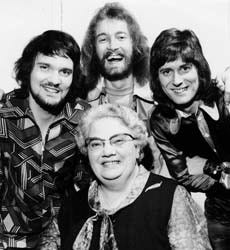In my youth, which is when most people tend to pay that bit more attention to such things, the charts were scattered from time to time with hits that somehow fell outside the general cadre of what is considered pop music. Such oddities included Terry Wogan, an Irish radio personality, singing the traditional English country song The Floral Dance, accompanied by the Brighouse & Rastrick Brass Band;1 there was the comedy duo of Stan Laurel and Oliver Hardy singing On the Trail of the Lonesome Pine, and German-British actor Conrad Veidt (he was in Humphrey Bogart’s Casablanca) thick-accentedly singing There’s a Lighthouse Shines Across The Bay (“Zeerz a Lighthouse Shine Zak-rrross ze Bay”). Nineteen seventy-two threw up two such oddities (at least), being the Military Band of the Royal Scots Dragoon Guards playing Amazing Grace, inter alia on the bagpipes, which was the most-sold record in the UK that year, and is the tune that, alone, would justify the invention of the bagpipes; and today’s excursion destination, which was the second-best-selling single in the UK in 1972. Yes, a gosh! moment.
The group were Lieutenant Pigeon (pronounced leff-tenant), which, as the astute will by now, naturellement, have surmised, was coined as an anagram of genuine potential. The oblique references continue: mouldy old dough is a call back to the 1927 jazz number Vo-do-do-de-o, although, like the title, it barely resembles the earlier hit, erring, as it does, more to what you might call military honky-tonk. The penny whistle is redolent of Billy, Don’t Be A Hero, which Paper Lace dished up two years later, in 1974. The dirty old men never were explained, even though the phrase comprises a good half of the lyric: it is reproduced below in its entirety for those who would like to sing along. For this is a record that was sung along to a lot—it was vastly popular in pubs across the nation, whose happy, inebriated patrons would, at the appropiate juncture, make rafters ring.
The group hailed from Coventry and their ensemble consisted of two back-to-back upright pianos, a penny whistle, base and drums. The second piano was played by Hilda Woodward, who was the mother of the guy playing first piano, Rob Woodward, making this the only ever number-one hit to feature mother and son as artists. Nigel Fletcher is the band’s other mainspring on drums, with Steve Johnson on pose-striking (and bass).
In the modern age of streaming, multi-channel entertainment consumption and all the music your heart could desire in a single monthly susbcription package, it is hard to see how hits like Wogan, Laurel & Hardy, Veidt, Amazing Grace and Lieutenant Pigeon would ever make the grade today. They’re not niche tastes as such: these records sold in their many thousands; niche taste only ever sells a few hundred, but sells it all the time. That means that, in these discs, the obscure shone in the limelight, if just for a few months—what was once described as fifteen minutes of fame.
Make the grade? What grade? I recently met up with a musical director with whom I had dined several years previously, and reminded her of a judgment she had levelled at pop music during our previous encounter, and from which she was then, as now, unshakable: “It’s rubbish. It’s rubbish.” And it is. But that’s not what pop music is about, it’s about what’s popular in the moment—even if it is rubbish.
Mouldy Old Dough
Written by Nigel Fletcher and Rob Woodward.
Performed by Lieutenant Pigeon.
From their 1972 album Mouldy Old Music.
Correction (never trust your memory, Graham): the Brighouse and Rastrick Brass Band recorded their arrangement (by Derek Broadbent, available here) in 1977, thus reviving the 1911 song’s popularity in the UK. Terry Wogan, cashing in on that popularity after having played the brass band’s version on his radio show on the BBC, recorded his rendition a year later, in 1978, accompanied by the Hanwell Band of west London (the version linked above).





